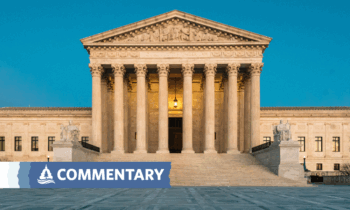 Are we on a steady slide to authoritarian rule in the United States? The Supreme Court, whose 2025-2026 Term began on October 6, has set the stage for such a descent in a series of quick rulings that favored President Trump over the last nine months.
Are we on a steady slide to authoritarian rule in the United States? The Supreme Court, whose 2025-2026 Term began on October 6, has set the stage for such a descent in a series of quick rulings that favored President Trump over the last nine months.
A key guardrail against authoritarianism by the Executive Branch is the independence of small, bipartisan, expert administrative agencies. An independent agency is a term that refers to agencies established by Congress, which, while part of the Executive Branch, have regulatory or quasi-judicial authority and are not under complete presidential control. But now, the Supreme Court appears poised to overrule almost 100 years of well-established law that allows these agencies to make decisions independently.
The independence of such agencies was confirmed back in 1935 in the landmark Supreme Court case of Humphrey’s Executor v. U.S. The Court unanimously held that the Constitution allows Congress to enact laws limiting the President’s ability to fire executive officials of an independent agency that is quasi-legislative or quasi-judicial in nature. The Humphrey’s Executor decision upheld the Federal Trade Commission Act of 1924, which prohibited the firing of any FTC Commissioner unless there was “cause,” which meant “inefficiency, neglect of duty, or malfeasance in office.” Independent agency officials could not be fired at the whim of a new incoming president.
Since then, the nation has been well-served by the “checks and balances” and political cooperation that independent agencies provide. A non-exhaustive list of such agencies that are most involved with the public interest, and most at risk of Trump’s firing their leaders – many of which he already has fired – includes: the Chemical Safety and Hazard Investigation Board (CSB), Consumer Financial Protection Bureau (CFPB), Consumer Product Safety Commission (CPSC), Federal Trade Commission (FTC), Merit System Protection Board (MSPB), National Labor Relations Board (NLRB), and Office of Special Counsel (OSC). The Federal Reserve, another independent body, has a unique history that has given it more protection from presidential meddling. The work of these independent agencies ranges from investigating industrial accidents to protecting consumers from financial fraud to ensuring that labor/employer relations are handled fairly. Basing their decisions on facts rather than loyalty to the President has been vital to their success.
Of particular importance to PEER and its clients is the MSPB, which Congress established in 1979 to decide appeals by civil servants of their proposed terminations or other severe disciplinary actions imposed by their agency bosses. The need for MSPB Board members to be insulated from the whims of the President or those around them is obvious. Federal agencies under the control of the Executive are firing or disciplining the civil servants, some of whom are whistleblowers revealing illegal or abusive actions by the administration. If MSPB members, who ultimately decide appeals about the merits of these cases, can be fired by the President for any reason, then they will be less inclined to rule against the President’s wishes or the agencies he controls.
Having MSPB’s institutional independence stripped away would undermine even the appearance of fairness to civil servants who wish to appeal actions to the MSPB.
President Trump’s actions against independent agencies fall under the extreme “Unitary Executive” theory promulgated by right-wing legal commentators. Under this theory, the President exercises the entire executive authority under Article II of the Constitution, meaning that Congress can put few limits on how he exercises that authority; this means he can fire any leader of any Federal agency at his whim. In pursuit of this theory, he has fired virtually all the Inspectors General and numerous Democratic members of the independent agencies mentioned above, as well as attempted to fire the Librarian of Congress, the heads of Smithsonian museums, and many others.
He replaced those fired often with hand-picked Trump choices — or sometimes left the positions vacant, which can deny the independent agency a quorum needed to make decisions. Several of those fired have fought back through lawsuits, which have largely succeeded in the lower Federal courts. However, those decisions have been stayed by the conservative majority of the Supreme Court in “Emergency Docket” decisions, which are made with minimal briefing and little to no explanation. While not final rulings, they signal the Supreme Court’s intention to overrule the Humphrey’s Executor precedent when the issue is squarely before them — and to adopt the Unitary Executive theory as an alternative.
It is a ridiculous time to be pushing that theory with Donald Trump in office. His judgment is driven by self-aggrandizement and seeking retribution against perceived enemies in the “Deep State,” which in his mind includes the independent expert agencies that are exercising his power. The Supreme Court degrades itself by facilely supporting his megalomania.
The case that had a severe impact on PEER and its clients is Trump v. Wilcox, 145 S. Ct. 1415, 1415 (2025), which allowed Mr. Trump to fire MSPB and NLRB Board members without cause. While not labeled as its final decision, the 6-3 ruling had the effect of removing the MSPB’s Chair, Cathy Harris, and denying the MSPB a quorum. Justice Kagan, joined by Justices Sotomayer and Jackson, authored a stinging dissent that attacked the Majority ruling as it “favors the President over our precedent; and it does so unrestrained by the rules of briefing and argument.” As a result, appeals of MSPB’s Administrative Judge decisions to the full Board have come to a halt and are likely to remain blocked unless the Senate confirms a new member to replace Ms. Harris.
It is essential that the Supreme Court does not destroy the independence of these quasi-independent agencies. That would be a start towards Unitary rule by all Presidents (not limited to Mr. Trump). The logical extension is that the President can then fire any Federal employee for any reason, or none at all, as Congress has no power to limit his control over the civil service that is carrying out his executive powers. Indeed, as this recent Washington Post article points out, Trump is making exactly that argument now before the MSPB: “Trump administration moves to curtail appeals by fired workers.” Frightening.
The only good news is that the Supreme Court has issued its unfavorable decisions on independent agencies all on its Emergency Docket, which were not final rulings; rather, they merely stayed the lower court rulings. The bad news is that a majority of the Justices have signaled they may completely abandon Humphrey’s Executor, in a case involving an FTC Commissioner whom Trump fired, in Trump v. Slaughter. The case will be briefed fully and have oral arguments this coming December. The Court must keep what is still left of our checks and balances system of government intact instead of giving “free reign” to an out-of-control authoritarian President.
 Peter Jenkins is PEER’s senior counsel.
Peter Jenkins is PEER’s senior counsel.